|
Family: Canidae (foxes, dogs and jackals)
Life
>
Eukaryotes >
Opisthokonta >
Metazoa (animals) > Bilateria > Deuterostomia >
Chordata > Craniata > Vertebrata (vertebrates) >
Gnathostomata (jawed vertebrates) > Teleostomi (teleost
fish) > Osteichthyes (bony fish) > Class:
Sarcopterygii (lobe-finned fish) > Stegocephalia
(terrestrial vertebrates) > Reptiliomorpha > Amniota >
Synapsida (mammal-like reptiles) > Therapsida > Theriodontia
> Cynodontia > Mammalia (mammals)
> Placentalia (placental mammals) > Laurasiatheria
> Ferungulata > Ferae > Carnivora
Species indigenous to southern Africa
|
Otocyon megalotis
(Bat-eared fox)
Bat eared foxes are mainly nocturnal but are seen during
the morning or evening, avoiding the heat of the day by sheltering in
vegetation or burrows. They locate their prey (insects such as beetle grubs
and termites) primarily by hearing, hence the large ears. It is the only
carnivore to have largely given up eating mammalian
prey.
|
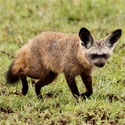 |
|
Lycaon pictus
(African wild dog)
Once widespread in subsaharan Africa, the distribution of
the African wild dog is now limited to a few large game reserves and wild
areas, and is classified as endangered by the IUCN. It lives and hunts in
packs with a dominant male and female in each pack. The pack assists the
alpha female in rearing and protecting her litters of puppies. Packs require
large home ranges and hunt down prey such as antelope over long distances,
eventually dragging the exhausted prey to the ground and tearing it open.
|
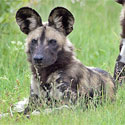 |
|
Vulpes chama (Cape
fox)
The only true fox found in southern Africa. They are
active mainly at night although can be seen in the early morning and
evening. Pairs mate for life and rear their litters in burrows. Prey
consists mainly of invertebrates and rodents but they also hunt birds and
reptiles. They also do sometimes kill new born lambs (up to three months
old) on sheep farms but it has been shown that this is rare and the effect
of this on sheep stocks is negligible. |
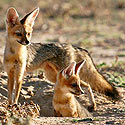 |
|
Canis adustus (Side-striped jackal)
|
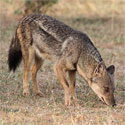 |
|
Canis mesomelas (Black-backed jackal)
Widespread in southern Africa but has been exterminated in
some farming areas as it attacks livestock. Pairs mate for life and rear
their litters in underground burrows made by other animals. They are
sometimes assisted by subadults from their previoius year's litter. They eat
a wide range of prey from invertebrates to small antelope and even consume
fruit.
|
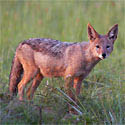 |
Domesticated species in southern Africa
|
Canis lupus familiaris (Dog) |
|
|
